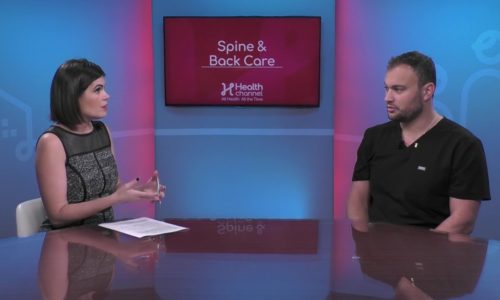Indications for Spinal Fusion |
There are some indications for spinal fusion: degenerative disc disease, spinal stenosis, spondylolisthesis, scoliosis, fracture and tumor.
Dr. Georgiy Brusovanik, Spine Surgeon with Baptist Health South Florida, explains in cases of tumors, after they are removed, it creates instability and it’s reasonable to do a fusion surgery where physicians place screws above and below and keep things in place.
Spondylolisthesis is the most common indication that Dr. Brusovanik sees in his practice.
Transcript
Let’s talk about the different indications for spinal fusion here they are the first one is degenerative disc disease you kind of brushed upon that a little bit yeah definitely so when the discs degenerate beyond repair it’s reasonable to take the disc out to restore the normal height and then hold it in place as we said earlier with screws spinal stenosis that can usually be corrected without screws but again if it’s in conjunction with significant disc degeneration or deformity haha scoliosis spondylolisthesis then it’s reasonable to talk about a fusion surgery the next one is spondylolisthesis Worth that’s where the spine where the disc has degenerated and then the spine kind of shifts and that’s really really painful very high correlation between that finding and patients having pain we use screws to correct that problem fractures in order to hold the spine in place until the bones mend together and tumors same if a tumor involves such a significant portion of the bony Anatomy then when you remove the tumor you create instability then it’s reasonable to do a fusion surgery where we place crews above and below and keep things solid in place and these six indications dr. which one would you say is the most common that you see in patients I would say spondylolisthesis realize in the years I would have thought the first one I would too but degenerative disc disease in itself should not regularly deserve a fusion surgery that’s too aggressive okay it’s only when it’s beyond repair it’s only when the discus collapsed 7080 percent and the patient has essentially developed deformity from losing that disc height now would you say that degenerative disc disease is the same thing if not similar to arthritis I would you wouldn’t I would and similar to arthritis everyone gets it but not everyone in fact few people will really suffer from it so just because you have disc degeneration doesn’t mean you have arthritis or vice versa or can you have both you got it I have a lot of questions there sorry we’ll have both you could have both but a great study out of ammo université 80 year olds who had no pain we did MRIs on them and we found that eighty percent of them had surgical pathology so everyone gets degeneration everyone gets arthritis but not everyone suffers from it you








